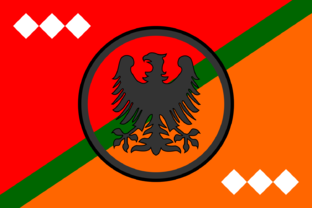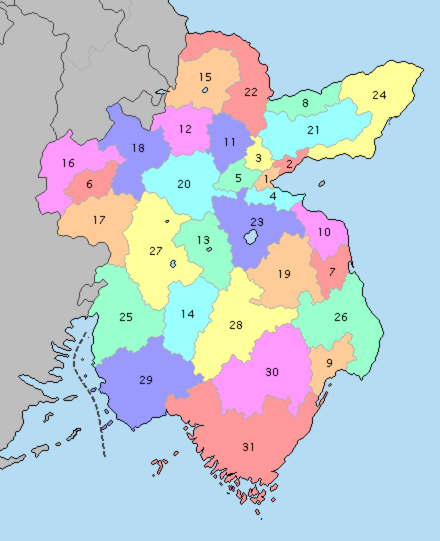Solea
The Socialist Autarky of Solea (Auxiliary Soleani: zekáhi zoletha apa) /sɤlɛʔa/ is a sparsely populated socialist nation located on the continent of Amalthea and is a founding member of the Free Federation. At the last census in 983, Solea had a population of 12.6 million. Solea is a very environmental and autarkic nation, rejecting the capitalist-imperialist views prevalent in some regions of Universalis. The country has no form of currency. The economy of Solea relies instead on a government-run rations system in which an individual carries a card or personal electronic device (which contains identification information) from which a national system keeps track of the individual's allowance for necessities and luxuries. This "rationing" is based on recent and current levels of production and availability within the nation. Anyone in Solea may move freely within the entire Free Federation at their own request. Immigration is tightly regulated from other regions to preserve the low population.
Contents
Etymology
The name Solea derives from the name of the river Solekh which runs through the Soleani capital city Saelunavvk.
History
In -293 the Empire of Nausikkak dissolved into three nations, Blaist Blaland, Darvincia, and Solea. After the uniting force was removed, the tribes of Solea quickly fell into a state of disorder. For several hundred years the tribes formed confederations which conquered and waned with time. By 250, several major powers established themselves and expansion of the major nations slowed. In 307, the Proclamation of the Soleani Tribal Confederation was declared among several of the major powers and over the next decades integration reunifed the tribes under one central government. In 515, the Tribal Confederation proclaimed itself a socialist autarky under the Nature of Government, a document based on the ideals of Blaist Communism.
Geography
The landscape of Solea is dominated by a prominent mountain range stretching north-south across the majority of the eastern part of the country, including a large plateau/highlands at the northernmost section which is in turn connected to an extension of the mountain range to the north and west into Eksola and Auspikitan. A major river system flows through the largest and capital city Saelunavvk out into the Serkr Ocean. The Aolejk Peninsula is for the most part extremely flat, except for a range of small mountains on the southern side.
Demographics
The Soleani people are mostly composed of native tribes that originated from the region east of the mountains and living along the Solekh, but has in recent years experienced high rates of immigration from overseas.
Government
Further information: Government of Solea
The government is a hybrid of several ideas, with the purpose of creating a system of checks and balances for most effective governing while protecting the interests of the people.
Administrative Divisions
| 1 | seilunavkw | 7 | tapasi | 13 | etskáş | 19 | paeŋ | 25 | kareŋ | 31 | fykisel |
|---|---|---|---|---|---|---|---|---|---|---|---|
| 2 | 8 | norluk | 14 | 20 | lahathwpúv | 26 | eqiri | ||||
| 3 | 9 | 15 | itilsekk | 21 | 27 | episwa | |||||
| 4 | vithpa | 10 | sevák | 16 | qespoşan | 22 | itigenepik | 28 | kavlsŋtše | ||
| 5 | aqeztn | 11 | kutapi | 17 | luteipuwa | 23 | atwa kahe | 29 | tilyvem | ||
| 6 | ihpkalik | 12 | ekewanet | 18 | kitak | 24 | athola | 30 | othavenevk |
Provinces are numbered by area.
Economy
Culture
The culture of Solea is unusually traditional, that is, clinging to the religious-based festivals and rituals, compared to the prevalence of religion in the country, which is extremely low. According to census data from 612, only a little more than 3% of the population still "believed in (a) higher power(s)" or held "other spiritual beliefs." In contrast, over three-fourths of the population (extrapolated from the 7000 surveyed) reported that they attended a local festival in the past year, according to a study conducted by the National Sociological Institute of Saelunavvk.
Most national festivals and holidays stem from original Soleani mythology, celebrating various things.
The culture of Solea is also highly nature-based, as evidenced by their mythology, practices, and society.
Health and Education
Solea has a nationalized healthcare system that is free for any citizen of the country. Yearly examinations and check-ups are mandatory for all Soleani citizens to ensure proper care and warning time concerning any serious health conditions.
Tourism
Solea is a highly popular ecotourism spot due to the government's strict protection of the environment and careful extraction and preservation of natural resources. Individuals wishing to travel to Solea can easily apply for a travel visa, but the government highly restricts who can enter due to the low native population, placing priority on those with relatives and family in Solea. In addition, Soleani law restricts the government from dealing with private tourism companies from other countries.
Sports
Dolphin and auto racing are very popular in Solea. Several racetracks and cetaceadromes have been constructed in Solea for the hosting of several international events.

